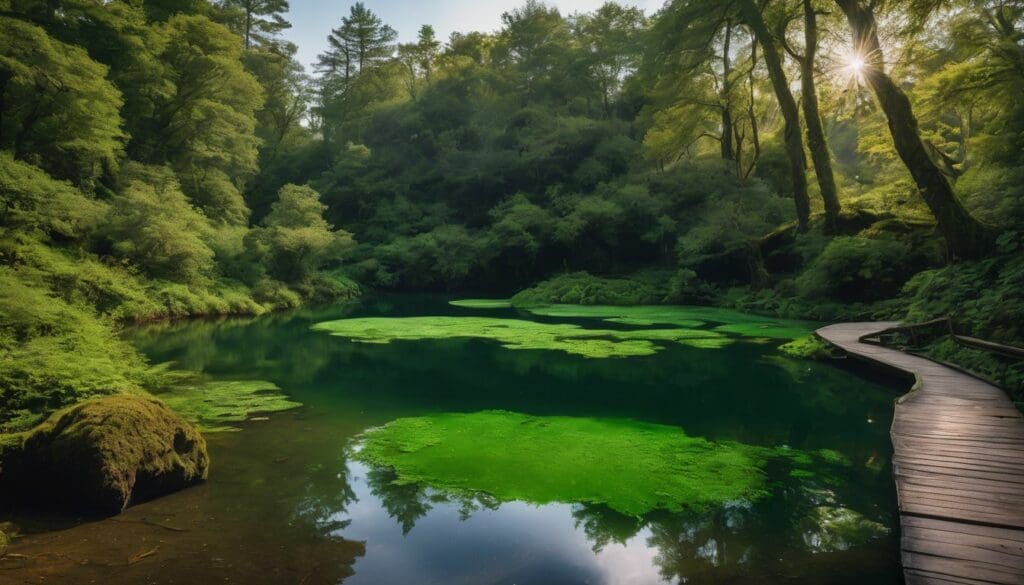Ever found yourself peering into your local pond or lake, puzzled by its sudden greenish hue? It’s a common conundrum that many of us have quietly observed, pondering the effects on our beloved watery havens.
Quite often, this verdant transformation can be chalked up to an abundance of algae – those minuscule powerhouses are essential cogs in the aquatic machinery, responsible for churning out a staggering 70% of Earth’s oxygen.
Let’s dip our toes into the intriguing world of these microscopic marvels and understand how they breathe life into our waters. Join us as we embark on an illuminating exploration that promises to enrich your next waterside wander!
Key Takeaways
- Algae are the foundation of aquatic food chains, producing 70% of Earth’s oxygen through photosynthesis and supplying vital nutrients to various water organisms.
- By absorbing excess nutrients and carbon dioxide, algae help prevent harmful algal blooms and combat climate change by reducing greenhouse gas levels.
- Studies on algae lead to advances in wastewater treatment, where they remove pollutants, improving water quality before it cycles back into the environment.
- Algae’s potential for biofuel production offers a sustainable energy alternative that lowers reliance on fossil fuels and helps preserve ecological balance.
- Protecting algae is essential for healthy water ecosystems as they support biodiversity, enhance water quality, and provide environmental benefits like oxygen production.
What is Algae?
Algae are a diverse group of aquatic organisms that play a unique role in water ecosystems. They are primary producers that use photosynthesis to reduce CO2 and provide chemical energy for other organisms.
Unique position in aquatic ecosystems
We see algae as foundational pillars in aquatic ecosystems, acting as primary producers that kick-start the food web. They hold a critical role by conducting photosynthesis, just like land-based plants, creating oxygen and organic materials that sustain countless marine organisms.
This activity not only bolsters water quality but also maintains ecological balance.
Through their existence, these phytoplankton trap nutrients, preventing harmful substance overloads which can lead to eutrophication—a process causing algal blooms and damaging biodiversity.
By anchoring the ecosystem’s health at its very base level, they enable other species to thrive in both fresh and saltwater environments.
Moving on from their unique positioning within aquatic systems, it’s important to explore how algae contribute to carbon dioxide reduction on a global scale.
Role in reducing CO2
Algae plays a crucial role in reducing CO2 levels in water ecosystems, performing the vital function of photosynthesis. This process involves absorbing carbon dioxide and releasing oxygen into the water, contributing to the overall balance of CO2 in aquatic environments.
Through this mechanism, algae actively participate in regulating carbon dioxide levels, which is essential for maintaining the ecological equilibrium within water ecosystems.
Furthermore, algal blooms absorb significant amounts of carbon dioxide from the atmosphere through their rapid growth and metabolism. This ability not only helps in mitigating CO2 concentration but also assists in counteracting ocean acidification, thereby providing a valuable environmental service.
Importance of Algae in Water Ecosystems
Algae play a crucial role in water ecosystems as they serve as a source of cellular carbon and chemical energy, supporting the growth and survival of other organisms. Additionally, algae also contribute to biogeochemical cycling and help maintain the balance within aquatic environments.
Source of cellular carbon and chemical energy
Algae serves as a crucial source of cellular carbon and chemical energy in water ecosystems. Through the process of photosynthesis, algae convert carbon dioxide into organic molecules, providing essential nutrients for other organisms in the ecosystem.
This nutrient cycling is vital for sustaining the balance of aquatic life and promoting biogeochemical cycling within the water environment.
Furthermore, the production of chemical energy by algae supports not only their own growth but also provides a foundation for other organisms to thrive. The continual supply of cellular carbon and chemical energy from algae plays a fundamental role in maintaining the delicate equilibrium of aquatic ecosystems, contributing significantly to overall environmental health.
Support for other organisms
Algae provides crucial support for other organisms in water ecosystems. As a primary producer, it forms the base of the food chain by providing essential nutrients and oxygen to various aquatic creatures such as fish, insects, and amphibians.
The presence of algae also contributes to maintaining a balanced ecosystem by serving as a habitat and food source for numerous microorganisms, invertebrates, and small fish.
Furthermore, algae play a vital role in sustaining biodiversity within water environments. Its diverse species provide different forms of sustenance for various organisms, ensuring that multiple levels of the aquatic food web are supported.
Algae in Basic Research
Algae play a crucial role in basic research, particularly in biogeochemical studies and applied biotechnology. Their unique properties make them valuable subjects for understanding the complex interactions within water ecosystems and exploring innovative solutions for environmental challenges.
Biogeochemical studies
Biogeochemical studies investigate how algae interact with the chemical and physical processes in aquatic ecosystems. These studies reveal how algae influence nutrient cycles, such as carbon, nitrogen, and phosphorus, which are essential for sustaining life in water environments.
By understanding these interactions, we can better manage and conserve our freshwater resources to support healthy ecosystems.
Through biogeochemical studies, scientists explore the roles of algae in regulating water quality and mitigating pollution through their ability to absorb heavy metals and toxins from their surroundings.
Applied biotechnology
Algae are a valuable resource for biotechnology, offering potential solutions to environmental challenges. Our research explores the diverse applications of algae, such as biofuel production and wastewater treatment.
By harnessing the unique properties of algae, we can develop sustainable technologies that support aquatic ecosystems and reduce our carbon footprint.
Through biotechnological advancements in algae research, we aim to create innovative solutions for environmental sustainability. These applications not only benefit water ecosystems but also offer promising opportunities for addressing global environmental issues in the future.
Applications of Algae in Water Ecosystems
Algae plays a crucial role in wastewater treatment, helping to remove pollutants and improve water quality. Additionally, algae can be used in biofuels production, providing a sustainable alternative to fossil fuels.
Wastewater treatment
Algae play a crucial role in treating wastewater by absorbing nutrients and contaminants from the water. This process helps in purifying the water before it re-enters the ecosystem.
- Algae are used in wastewater treatment to reduce excessive nutrients such as nitrogen and phosphorus, which can otherwise lead to harmful algal blooms.
- The presence of algae aids in breaking down organic matter in wastewater, improving water quality and reducing the risk of pollution.
- Through photosynthesis, algae consume carbon dioxide present in the water, contributing to overall carbon sequestration and mitigating climate change impacts.
- Algal biomass produced during wastewater treatment is harvested for various applications including biofuel production and as a source of high-protein animal feed supplements.
- Ultimately, algae serve as an eco – friendly and efficient solution for cleaning up wastewater, promoting environmental sustainability and supporting aquatic ecosystems.
Biofuels production
- Algae’s high lipid content is extracted and processed into biofuels, providing a sustainable energy source that mitigates the impact of climate change.
- The production of algae-based biofuels minimises environmental degradation and supports conservation efforts by offering an eco-friendly alternative to conventional fuel sources.
- By converting algae into biofuels, we contribute to the reduction of greenhouse gas emissions, fostering a more balanced aquatic ecosystem for the benefit of all organisms.
Conclusion
In summary, algae plays a crucial role in maintaining the balance of water ecosystems. It serves as a vital source of cellular carbon and chemical energy, supporting the survival of various organisms.
Its applications in wastewater treatment and biofuels production further underline its significance for environmental sustainability. Understanding and preserving the role of algae is essential in ensuring the health and stability of water ecosystems for future generations to come.
FAQs
1. What role do algae play in water ecosystems?
Algae are important aquatic plants that help maintain ecosystem balance and contribute to overall aquatic ecology by producing oxygen and serving as food for other organisms.
2. Can algae impact the health of a water ecosystem?
Yes, healthy levels of algae support a balanced aquatic environment, but too much can harm the ecosystem’s health by reducing oxygen levels in the water.
3. Do all water ecosystems need algae?
While not every single body of water must have algae, most aquatic ecosystems rely on these plants to provide essential nutrients and oxygen which support diverse forms of life.
4. How do changes in algae populations affect other organisms?
Changes in the abundance of algae can significantly influence the availability of resources for other species and shift the equilibrium within an aquatic ecosystem.





